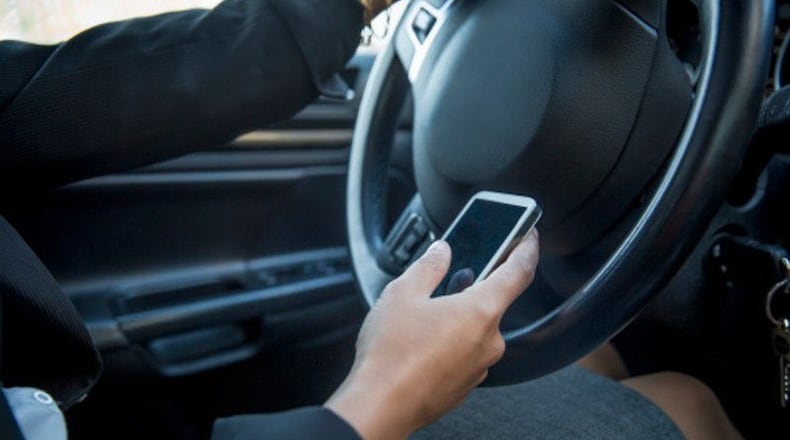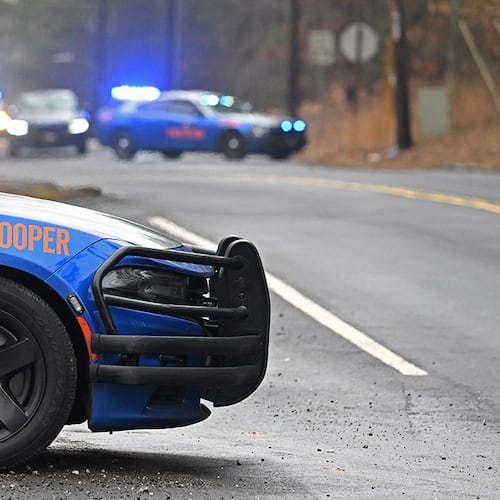Distracted driving is still a major factor in the increase in road fatalities in 2021. An amendment sponsored by 17 senators in the Georgia legislature, however, would loosen the rules on the state’s biggest stab at enforcing anti-texting laws.
State Senator Frank Ginn (R-Danielsville) leads the bipartisan effort that would add to the exemptions in the 2018 Hands-Free Georgia Act. Their proposal: allow drivers to hold and use their phones when vehicles are at a complete standstill at any kind of traffic control device.
Many drivers do, Ginn said, and he thinks loosening this restriction is common sense.
“I’m not trying to make it unsafe for anybody on our highways. But I do know if you’re lost — if you’re making u-turns, if you’re panicked, if you’re getting late — that’s when you’re going to make a dumb driving mistake.” Ginn argues that people will drive more safely if they’re allowed to orient themselves while stopped.
Ginn pointed to his own difficulties in being able to see things on his phone mounted away from him and how the voice-activated settings do not work well on his device. “For me, this is simple: When your vehicle is sitting perfectly still, it’s not a crime.”
But he stressed his belief in the nature of the current law and the other distractions it forbids. “I want to keep our current distracted driving laws in place,” Ginn said. “I don’t want you going down the road holding your phone.” Ginn likens distracted driving to drunk driving, as many safety advocates do.
One such safety advocate, state Rep. John Carson (R-Marietta), the lead sponsor of the hands-free bill, has not commented when asked multiple times about Ginn’s amendment. GDOT also will not comment, though the agency campaigns very actively against distracted driving.
In 2018, Ginn helped negotiate the first time-offender loophole in that bill, which allows people to escape penalty if they show a judge a signed affidavit that they have an appropriate hands-free device. Carson unsuccessfully proposed ending that loophole in 2021.
Ginn, who chairs the Senate Transportation Committee and is well-connected in the public safety-law enforcement arena, said he has heard from people who got tickets from undercover officers at traffic lights. Those offenders thought those tickets were cheap shots, similar to driving five over the speed limit in a well-known speed trap. “I just don’t want to make criminals out of our hard working citizens when they’re not endangering somebody.”
He also has heard from officers in rural areas who don’t want to write these tickets because judges there know the families and throw out those small charges.
Ginn compared these offenses to slowing down and rolling through a stop sign when an intersection is empty. A driver in that case would have shown caution. They obeyed the nature of the law.
“One of the great things we give with our law enforcement is discretion,” says Ginn, whose amendment has gone to the State Senate’s Public Safety Committee, where it received its first hearing Feb 3.
Safety advocates oppose change
Mike Lutzenkirchen heads the Lutzie43 Foundation, which campaigns against drunk and distracted driving. Mike’s son, Phillip Lutzenkirchen, a standout Auburn football player from Cobb County, got thrown from a vehicle in a 2014 crash not long after his playing career ended. The driver and all passengers had been drinking and the driver was speeding. Phillip wasn’t wearing a seatbelt and the crash killed the 23 year-old instantly.
“The ‘hands-free’ bill or law was established to change behavior that has led to thousands of crashes, injuries and fatalities,” Lutzenkirchen explained. “[Senate Bill 356] reduces the seriousness of [the law] being ‘hands-free.’”
Lutzenkirchen said that a car stopped, but still in drive, is more dangerous than its being parked.
Jenny Harty echoes that sentiment. She works as community relations director for Montlick and Associates’ iRideSafe driver and child safety program, after a bad crash nearly killed her daughter, Madison. After that, Harty campaigned to toughen the state’s car seat rules, eventually getting “Madison’s Booster Seat Law” enacted in 2004. Harty’s help was also instrumental in the Hands-Free Georgia Act.
“The question to me is why would we choose to backtrack on a law to accommodate people that are breaking it?” Harty said, noting that the law was key in driving down Georgia driving fatalities in the two years before the pandemic.
Harty also drew on a 2013 AAA Foundation for Traffic Safety study that found the human brain needs 27 seconds to recover from the distraction of even using legal speech-to-text features. Certainly, Harty said, if a stopped driver holds their phone and checks texts and directions or scrolls social media, their brain isn’t going to be over the distraction when traffic moves. Even a half-distraction can cause a wreck. There also is the annoying instance of a distracted driver keeping traffic stopped at a green light.
Influenced by criticism like this, Ginn has changed the amendment to only allow drivers to hold phones while at a traffic control device and not simply while a car is stopped.
Harty, Lutzenkirchen and Ginn all agree that people often ignore the current law. Ginn thinks that is a sign to better focus the intent of the law. But Lutzenkirchen was gravely direct: Would any lawmaker that lost someone close to them in a crash caused by bad driving behavior want to liberalize safe driving laws?
One side that fights for laws like this thinks this law should be tougher. Meanwhile, Ginn and his camp want to stop punishing what they see as common sense behavior.
S.B. 356 may only ever be a discussion point and, as of early on Friday, February 4th, hasn’t left the committee. But the fact that a coalition of 12 Republicans and five Democrats agreed on it could be a harbinger of its success under the Gold Dome.
Doug Turnbull, the PM drive Skycopter anchor for Triple Team Traffic on 95.5 WSB, is the Gridlock Guy. He also hosts a traffic podcast with Smilin’ Mark McKay on wsbradio.com. Contact him at Doug.Turnbull@cmg.com.
About the Author
The Latest
Featured


